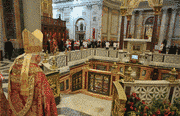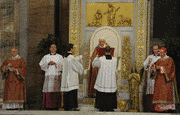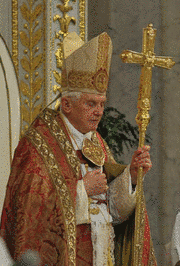Feast of the Holy Apostles Peter and Paul 2010
Benedict XVI's Homily at First Vespers in the Basilica of St Paul Outside the Walls
Sunday 28 June 2010 - in English, French, German, Italian, Portuguese & Spanish
"Dear Brothers and Sisters,
With the celebration of First Vespers we enter the Solemnity of Sts Peter and Paul. We have the grace to do so gathered in prayer by the tomb of the Apostle to the Gentiles, in the Papal Basilica named after him. For this reason I wish to focus my brief reflection on the perspective of the Church's missionary vocation. The third Antiphon of the Psalter which we have prayed in addition to the biblical Reading is oriented in this direction. The first two Antiphons are dedicated to St Peter and the third to St Paul, and it says: "You are the chosen instrument of God, St Paul, Apostle, the preacher of truth in all the world". And in the brief Reading, taken from the opening address of the Letter to the Romans, Paul introduces himself as "apostle by God's call, set apart for the service of the Gospel" (cf. Rom 1:1). The figure of Paul his person and his ministry, the whole of his life and his hard work for the Kingdom of God is entirely dedicated to the service of the Gospel. In these texts one notices a sense of movement where the protagonist is not man, but God, the breath of the Holy Spirit, that impels the Apostle on the highways of the world to bring the Good News to everyone: the promises of the Prophets are fulfilled in Jesus, the Christ, the Son of God, who died for our sins and was raised for our justification. Saul is no longer, instead there is Paul, indeed there is Christ who lives in him (cf. Gal 2:20) and wants to reach out to all people. Although the Feast of the Holy Patrons of Rome thus calls to mind the twofold aspiration to unity and to universality that is characteristic of this Church, the context in which we are gathered this evening calls us to give priority to the latter, letting ourselves, so to speak, be "drawn" by St Paul and his extraordinary vocation.
When, during the Second Vatican Council, the Servant of God Giovanni Battista Montini was elected Successor of Peter he chose to take the name of the Apostle to the Gentiles. Paul VI included in his programme for the implementation of the Council the convocation, in 1974, of the Assembly of the Synod of Bishops on the theme of evangelization in the modern world. About a year later, he published the Apostolic Exhortation Evangelii Nuntiandi, which begins with these words: "There is no doubt that the effort to proclaim the Gospel to the people of today, who are buoyed up by hope but at the same time often oppressed by fear and distress, is a service rendered to the Christian community and also to the whole of humanity" (n. 1). The timeliness of these words is striking. Paul VI's special missionary sensitivity can be perceived in them and, through his voice, the Council's deep yearning for the evangelization of the contemporary world. This yearning culminates in the Decree Ad Gentes but runs through all the documents of the Second Vatican Council and, even earlier, inspired the thoughts and work of the Council Fathers, convoked to represent, in an unprecedented, tangible way, the dissemination throughout the world achieved by the Church.
Words are useless to explain how Venerable John Paul II, in his long Pontificate, developed this missionary outreach that it should always be remembered corresponded with the very nature of the Church which, with St Paul, can and must always repeat: "If I preach the Gospel, that gives me no ground for boasting. For necessity is laid upon me. Woe to me if I do not preach the Gospel!" (1 Cor 9:16). Pope John Paul II represented the Church's missionary nature "in the flesh" with his Apostolic Journeys and with the insistence of his Magisterium on the urgent need for a "new evangelization": "new" not in its content but in its inner thrust, open to the grace of the Holy Spirit which constitutes the force of the new law of the Gospel that always renews the Church; "new" in ways that correspond with the power of the Holy Spirit and which are suited to the times and situations; "new" because of being necessary even in countries that have already received the proclamation of the Gospel. It is evident to all that my Predecessor gave the Church's mission an extraordinary impetus, not only I repeat because of the distances he covered but above all because of the genuine missionary spirit that motivated him and that he left as a legacy at the dawn of the third millennium.
In receiving this legacy, I was able to state, at the beginning of my Petrine ministry, that the Church is young and open to the future. And I repeat this today, close to the tomb of St Paul. The Church is an immense force for renewal in the world. This is not, of course, because of her own strength but because of the power of the Gospel in which the Holy Spirit of God breathes, God Creator and Redeemer of the world. The challenges of the present time, the historical and social and, especially, the spiritual challenges, are certainly beyond the human capacity. It sometimes seems to us Pastors of the Church that we are reliving the experience of the Apostles when thousands of needy people followed Jesus and he asked them: what can we do for all these people? They were then aware of their powerlessness. Yet Jesus himself had shown them that with faith in God nothing is impossible and that a few loaves and fish, blessed and shared, could satisfy the hunger of all. However, there was not and there is not hunger solely for material food: there is a deeper hunger that only God can satisfy. Human beings of the third millennium want an authentic, full life; they need truth, profound freedom, love freely given. Even in the deserts of the secularized world, man's soul thirsts for God, for the living God. It was for this reason that John Paul II wrote: "The mission of Christ the Redeemer, which is entrusted to the Church, is still very far from completion", and he added: "an overall view of the human race shows that this mission is still only beginning and that we must commit ourselves wholeheartedly to its service" (Encyclical Redemptoris Missio, n. 1). There are regions of the world that are still awaiting a first evangelization; others that have received it, but need a deeper intervention; yet others in which the Gospel put down roots a long time ago, giving rise to a true Christian tradition but in which, in recent centuries with complex dynamics the secularization process has produced a serious crisis of the meaning of the Christian faith and of belonging to the Church.
From this perspective, I have decided to create a new body, in the form of a "Pontifical Council", whose principal task will be to promote a renewed evangelization in the countries where the first proclamation of the faith has already resonated and where Churches with an ancient foundation exist but are experiencing the progressive secularization of society and a sort of "eclipse of the sense of God", which pose a challenge to finding appropriate to propose anew the perennial truth of Christ's Gospel.
Dear Brothers and Sisters, the challenge of the new evangelization calls into question the universal Church and asks us to continue with commitment our search for full Christian unity. An eloquent sign of hope in this regard is the custom of reciprocal visits between the Church of Rome and that of Constantinople for the Feast day of their respective Holy Patrons. Today, therefore, we welcome with renewed joy and gratitude the Delegation sent by Patriarch Bartholomaios I, to whom we address our most cordial greeting. May the intercession of Sts Peter and Paul obtain for the entire Church ardent faith and apostolic courage, to proclaim to the world the truth we all need, the truth that is God, the beginning and end of the universe and of history, the merciful and faithful Father, hope of eternal life. Amen."
Papa Benedict XVI's Homily at Mass for the Imposition of the Sacred Pallium in St Peter's
- in English, French, German, Italian, Portuguese & Spanish
"Dear Brothers and Sisters,
In their great wealth, the biblical texts of this Eucharistic Liturgy on the Solemnity of the Holy Apostles Peter and Paul highlight a theme that could be summed up in these words: God is close to his faithful servants and delivers them from all evil and delivers the Church from negative powers. It is the theme of the Church's freedom, that presents an historical aspect and another that is more profoundly spiritual.
This theme runs through the whole of today's Liturgy of the Word. The First and Second Readings speak respectively of St Peter and St Paul, stressing God's liberating action in their regard.
The text of the Acts of the Apostles especially describes with an abundance of detail the intervention of the Angel of the Lord who sets Peter free from his chains and leads him out of the prison of Jerusalem in which Herod the King had had him locked up and placed under strict surveillance (cf. Acts 12:1-11). Paul, on the other hand, in writing to Timothy when he felt he was approaching the end of his earthly life, makes a concise summary of it from which emerges the fact that the Lord has always been close to him, has delivered him from many dangers and will free him again, introducing him into his eternal Kingdom (cf. 2 Tim 4:6-8, 17-18). The theme is reinforced by the Responsorial Psalm (Ps 34[33]), and is also given a special development in the Gospel passage of Peter's profession where Christ promises that the powers of death shall not prevail over the Church (cf. Mt 16:18).
A close look at this theme reveals a certain progression. In the First Reading a specific episode is recounted that shows the Lord's intervention to release Peter from prison. In the Second Reading Paul, on the basis of his extraordinary apostolic experience, says that he is convinced that the Lord, who has already rescued him "from the lion's mouth", will rescue him "from every evil", opening the gates of Heaven to him; on the other hand, in the Gospel nothing further is said of the individual Apostles but it speaks rather of the Church as a whole and of her indemnity from the forces of evil, meant in the full and profound sense. Thus we see that Jesus' promise "the powers of death shall not prevail against" the Church does indeed include the historical experiences of persecution that Peter and Paul and other Gospel witnesses suffered, but goes beyond them, with the intention of assuring protection, especially from threats of a spiritual kind; in accordance with what Paul himself writes in his Letter to the Ephesians: "for we are not contending against flesh and blood, but against the principalities, against the powers, against the world rulers of this present world of darkness, against the evil spirits in the heavens" (cf. Eph 6:12).
Indeed if we think of the two millenniums of the Church's history, we may note as the Lord Jesus had foretold (cf. Mt 10:16-33) that trials for Christians have never been lacking and in certain periods and places have assumed the character of true and proper persecution. Yet, despite the suffering they cause, they do not constitute the gravest danger for the Church. Indeed she is subjected to the greatest danger by what pollutes the faith and Christian life of her members and communities, corroding the integrity of the Mystical Body, weakening her capacity for prophecy and witness, and marring the beauty of her face. The Pauline Letters already testified to this reality. The First Letter to the Corinthians, for example, responds precisely to certain problems of division, inconsistence and infidelity to the Gospel that seriously threaten the Church. However, the Second Letter to Timothy a passage to which we listened also speaks of the perils of the "last days", identifying them with negative attitudes that belong to the world and can contaminate the Christian community: selfishness, vanity, pride, the attachment to money, etc. (cf. 3:1-5). The Apostle's conclusion is reassuring: men who do evil, he writes, "will not get very far, for their folly will be plain to all" (3:9). Therefore a guarantee exists of the freedom that God assures the Church, freedom both from material ties that seek to prevent or to coerce her mission and from spiritual and moral evils that can tarnish her authenticity and credibility.
The subject of the Church's freedom, which Christ guaranteed to Peter, is also specifically relevant to the rite of the conferral of the Pallium, which today we renew for 38 Metropolitan Archbishops, to whom I address my most cordial greeting, which I extend with affection to all who have wished to accompany them on this pilgrimage. Communion with Peter and with his Successors is in fact a guarantee of freedom for the Church's Pastors and for the Communities entrusted to them. It has been highlighted at both levels in the previous reflections. At the historical level, union with the Apostolic See guarantees the particular Churches and the Bishops' Conferences freedom from local, national or supranational powers that in some cases can hinder the Church's mission. In addition, and more essentially, the Petrine ministry is a guarantee of freedom in the sense of full adherence to the truth, to the authentic tradition, so that the People of God may be preserved from errors concerning faith and morals. Therefore the fact that new Metropolitans come to Rome every year to receive the Pallium from the Pope's hands as a gesture of communion should be understood in its true sense, and the subject of the Church's freedom gives us a particularly important key to its interpretation. This appears obvious in the case of Churches marked by persecution or subjected to political interference or other harsh trials. However, this is equally important in the case of Communities that suffer the influence of misleading doctrines or ideological trends and practices contrary to the Gospel. In this sense, therefore, the Pallium becomes a pledge of freedom, comparable to the "yoke" of Jesus which he invites each person to take upon his or her shoulders (cf. Mt 11:29-30). Just as Christ's commandment although exacting is "easy and light" and, instead of weighing on those who carry it uplifts them, so the bond with the Apostolic See although demanding sustains the Pastor and the portion of the Church entrusted to his care, making them freer and stronger.
I would like to draw one last instruction from the word of God, and in particular from Christ's promise that the powers of death will not prevail over his Church. These words can also have an ecumenical meaning since, as I mentioned just now, one of the typical effects of the action of the Evil One is, precisely, the internal division of the ecclesial Community. Ruptures are in fact symptoms of the power of sin that continues to act in members of the Church even after the redemption. However, Christ's word is clear: "Non praevalebunt they shall not prevail" (Mt 16:18). The unity of the Church is rooted in her union with Christ and the cause of full Christian unity that must ever be sought and renewed, from generation to generation is also sustained by his prayer and his promise. In the struggle against the spirit of evil, God gave us in Jesus, the "Advocate" defender, and after his Pasch, "another Counsellor" (cf. Jn 14:16), the Holy Spirit, who stays with us always and leads the Church towards the fullness of the truth (cf. Jn 14:16; 16:13) that is also the fullness of love and of unity. With these sentiments of trusting hope, I am glad to greet the Delegation of the Patriarchate of Constantinople which, in accordance with the beautiful custom of reciprocal visits, is taking part in the celebrations for the Holy Patrons of Rome. Let us thank God together for the progress in ecumenical relations between Catholic and Orthodox, and let us renew our commitment to respond generously to God's grace that is leading us to full communion.
Dear friends, I cordially greet each one of you, Your Eminences, my Brothers in the Episcopate, the Ambassadors and the Civil Authorities and, in particular, the Mayor of Rome, the priests, religious and lay faithful. Thank you for coming. May the Holy Apostles Peter and Paul obtain that you increase in love for the Holy Church, Mystical Body of Christ and Messenger of Unity and Peace for all mankind. May they also obtain that you joyfully offer for her holiness and her missionary efforts your endeavours and suffering, borne out of faithfulness to the Gospel. May the Virgin Mary, Queen of Apostles and Mother of the Church always watch over you and in particular over the ministry of the Metropolitan Archbishops. With her heavenly help may you always live and act in that freedom which Christ won for us. Amen."


